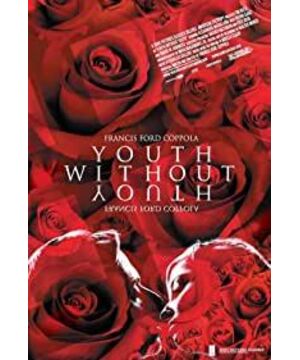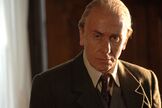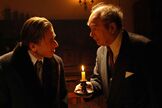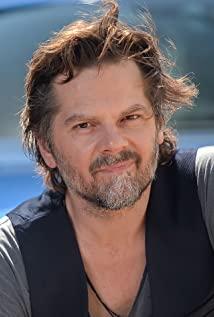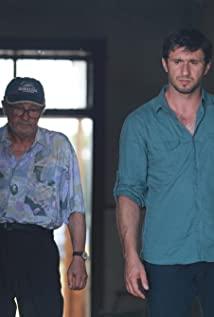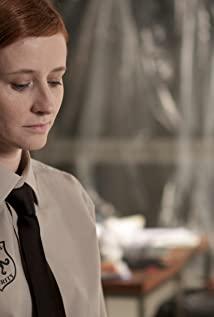It was also an accidental disaster. Compared to the victims in Sichuan, the name was Dominic. Ma Tai's old man is very lucky. Not only did his life not suffer, but he was also amazingly rejuvenated. He possessed superhuman wisdom and ability, and spent a period of "youth without youth". Director Coppola used sci-fi skills to start the narrative without any preparation or foreshadowing. From this point of view, since this film is not a science-fiction film, it cannot have a better ending like an ordinary science-fiction film. There is no free lunch in the world. The film ends in tragedy and runs through the film with a tragic atmosphere, which lays the foundation for the film to explore the meaning of life from a philosophical level.
Is it possible for people to have superhuman intelligence and ability? This is a question that has been discussed since the beginning of this film. Coppola first made a positive assumption about Dominic. Ma Tai's lengthy narration after being struck by lightning is a direct demonstration of this proposition, and it is not until the end of the film that he gives a negative answer.
Superhuman wisdom and ability are what everyone is eager to have. The young Ma Tai is keen to explore the source of human language, but this task is something that Ma Tai cannot complete in ten lifetimes. In the film, Ma Tai's teacher said: "This young man is indeed very smart, but..." The ellipsis part goes without saying, it is impractical to study such a subject. The young Ma Tai was obsessed and never tired of it. The beloved woman he lost because of this, died alone and achieved nothing, and realized with grief that "I am a loser". An old man is not waiting for the natural end of his life, but is preparing to commit suicide by taking poison. Such a fact cannot but be regretted.
At this time, the need to possess superhuman wisdom and ability came into being. It was Coppola's hypothesis that saved him, allowing him to regain his immortal body, as well as superhuman wisdom and ability, allowing him to cleverly escape the Nazis Manhunt, learned multiple languages in a dream, regained love, and almost fulfilled a lifelong long-cherished wish. These comedy factors have created a delightful viewing experience for this film. It is a pity that there is a contradiction between this superhuman intelligence and ability, the love generated by human instinct, the stable personality constrained by social factors and historical conditions, and this contradiction is the source of the tragic atmosphere of the film, and Dominates later in the film.
The direct consequence of this contradiction is the split of personality, which is called dual personality in the film. A person suddenly possesses superhuman wisdom and ability, which is unbearable for the primitive basic personality constrained by social and historical factors. If it can truly be integrated, then this human being said to come from the future must be the same as that of the fourth century of the 20th century. The society in the 1950s was out of tune. If the identity and function of the basic personality were not used, the wisdom and ability of the superman would become a tree without roots, and a dual personality would inevitably arise. Dual personality is a serious psychological disorder characterized by a person having two or more independent and opposing personality traits. However, the dual personalities of the male protagonist Ma Tai in the film are not independent of each other, but are opposed to each other. His second personality appears as the guardian and sublimator of Ma Tai's basic personality, so let's call it a superhuman personality first. The two are inseparable and live together. With the help of the superhuman personality, Ma Tai's basic personality has created many unimaginable and mysterious events. Such a harmonious dual personality makes people envious for a time.
The problem is that Ma Tai's superhuman personality is too rational. Even though he has superhuman wisdom and ability, he can know the past and future events, but he can't do anything about love, which is a natural product of basic personality. Ma Tai is dying in love. At the critical moment in the past, he did not follow the advice of the superhuman personality and gave up the research on the origin of human language. This event caused the dual personality to split and brought back the emotion back to the pessimism and despair at the beginning of the film, which also led to Mattai and the superhuman personality. The complete break of Zhuang Zhou Mengdie at the end of the film is Ma Tai's inertial reaction after losing his superhuman personality, Ma Tai finally returns to the inevitable cycle of birth, old age, sickness and death of ordinary human beings. At this point, the entire thesis on "Can humans have superhuman intelligence and ability" has an answer, no possibility.
Humans' pursuit of superhumanity or transcendence is profoundly reflected in science and various religious philosophies. Coppola first denied using extreme scientific means to change human body functions, and then focused on citing Indian Buddhism (actually Tibetan esotericism) and Chinese Take Lao-Zhuang philosophy as an example, because both philosophies preach that people can achieve superhuman (Buddha) or transcendental realms through cultivation, but as we all know, these two philosophies can only give people spiritual sublimation. Of course, the eminent monks cannot cure all diseases, and the Southern Dynasty hermits who are detached from the world are still remembered by later generations. Coppola knew this, so Buddhism is used as a way to explore the original language in the film, while Lao Zhuang philosophy can only use the sentence "Life is like a dream, only Tao" and the story of Zhuang Zhou Mengdie to seek spiritual liberation.
Coppola used science, Buddhism and Lao-Zhuang philosophy as examples to explain the reasons why people cannot become superhumans, but there is a summary of the reasons from the philosophical level. From the front page of newspapers), the real reason for this problem lies in Marx. Marxism discusses that man is a social animal, and man cannot develop independently from the actual economic and social foundation. This materialist view is pessimistic. , but is correct.
Writing this reminds me of the various natural and man-made disasters that have befallen the Chinese people this year. Man-made disasters can still be discussed, but the frequent natural disasters really make the Chinese people feel wronged. Therefore, while fighting against disasters, some feng shui, astrology and the like are inevitable. Predictions are widely circulated on the Internet. It cannot be said that these are all rumors to confuse the public. At least it expresses a necessary knowledge for many people in the face of unpredictable disasters, even if the object is feng shui and astrology. It is more unreliable than science and philosophy. s things. This kind of knowledge is irresistible. For unknown phenomena, people always want to know the reason. Marxism is too materialistic, too realistic, and too pessimistic, which is not easy for people to accept. On the contrary, religion, philosophy and other theories are easier to accept and spread. Blindly harmonizing all non-communist speeches, I don't think it is what the contradiction theory requires.
Whether a person can become a god, the answer is no, but Buddhism and Lao Zhuang give us the possibility to pursue this state. Reach for the stars, impossible to succeed without getting your hands dirty. There may be only one truth, but it cannot be denied that other ideas have rationality. I think this is why Coppola used such complex elements to create such a hypothesis.
View more about Youth Without Youth reviews


